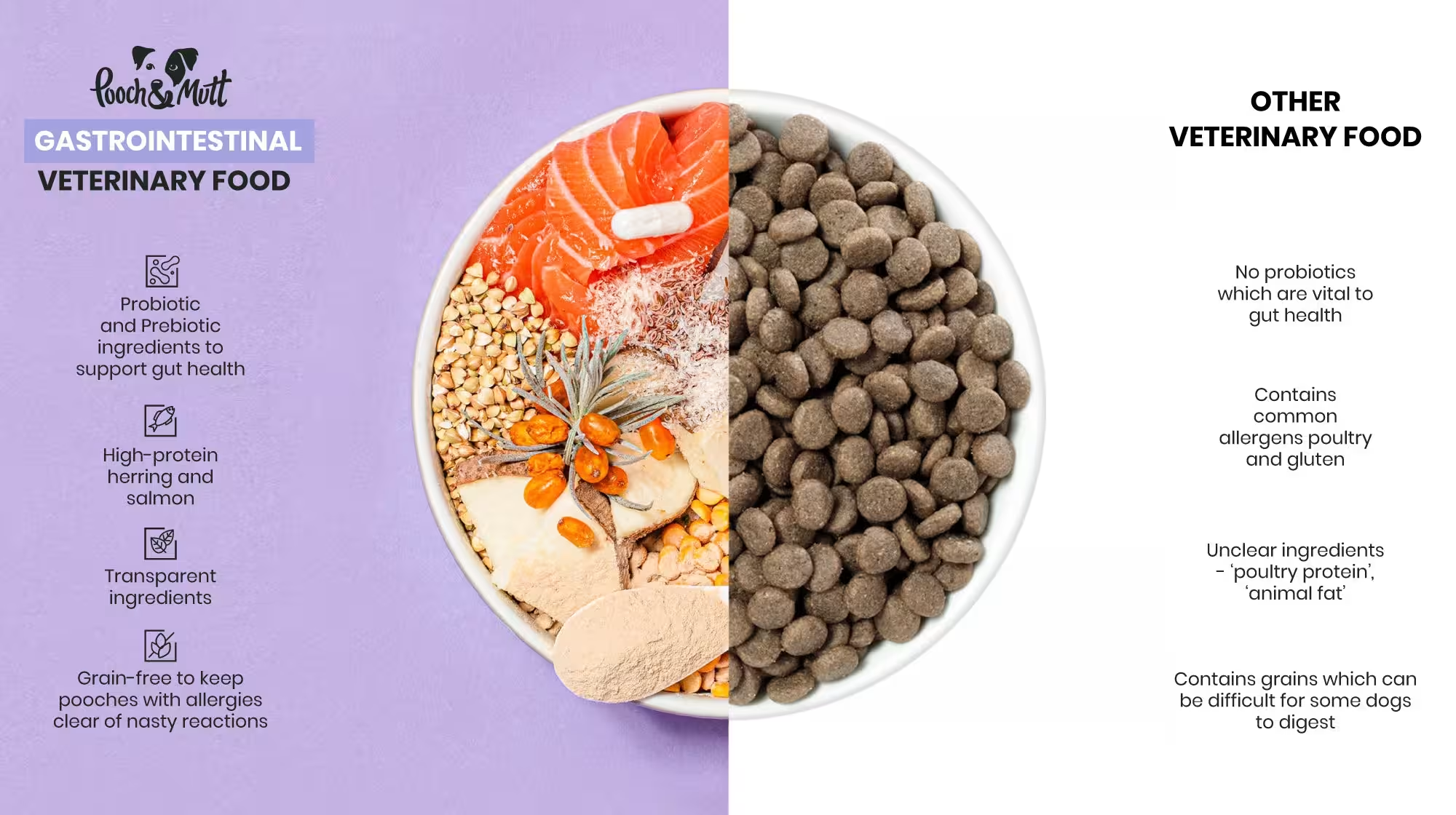Everyone knows gastrointestinal issues are nasty, and when your dog suffers from them regularly it can be distressing for both you and your poor pooch. Gastroenteritis can be a short-term or persistent issue, depending on your dog’s health condition and whether they have a particularly sensitive stomach. If you’ve already established that your dog has repeated issues with vomiting, diarrhoea and a sore belly, you might be wondering, what do I feed a dog with gastrointestinal problems?
Read on for our rundown on the best food for dogs with gastrointestinal issues, because as always - a dog’s health, happiness and wellbeing begins with what they eat every day.
Nutrition and diet for dogs with gastrointestinal problems
A dog tummy that’s easily triggered needs careful consideration when it comes to diet and nutrition. If your dog has gastrointestinal problems, they should have a strict feeding routine that’s nearly always the same, to have the most reduced chance of stomach stress.
Overall, you should avoid feeding them sugary treats or human scraps. Quite often, stomach issues in dogs can come from too little exposure to a certain food group, or too much of something else, such as sugar or fats.
Do dogs with gastrointestinal problems need low fat dog food?
The general consensus among experts is that high levels of fat can cause havoc with a dog’s gut, so if your dog suffers from gastrointestinal problems on the regular, you should be choosing a dog food with low fat levels to curb any nasty intestinal triggers. This is a particular problem with dogs who have pancreatitis, as an excess of fat is often what causes the illness and it can severely exacerbate its symptoms.
What to feed a dog with pancreatitis
Pancreatitis is a potentially serious condition affecting the pancreas and how a dog produces certain vital enzymes for digestion. If gone untreated it can be life-threatening, so if your dog has suffered from it in the past, be extremely vigilant over what they’re fed. This generally means no human food, no fatty foods, and choosing a prescription or specialist dog food that contains no more than 10% fat as part of their daily treatment.
Aside from this, be sure to let family, friends and well-meaning house guests know that sneaking your pooch some chicken skin or sausage roll under the table isn’t doing them any favours, it could actually do them serious harm.
Food for dogs with gastrointestinal problems or pancreatitis
We’ve established that dogs with gastrointestinal problems or pancreatitis need special care, especially when it comes to what they eat. As well as avoiding human scraps, fatty treats or junk food, they should be fed dog food that is formulated specifically for turbulent tummies.
If you feed your dog commercial pet food, be particularly diligent over reading the label and nutrition information. Don’t choose a cheap food that contains preservatives, artificial ingredients or ‘filler’ products - the food should contain a high level of lean proteins, have low fat and be of a premium quality.
You may be using a prescription or specialist dog food, recommended by your vet - this is usually the case when a dog is diagnosed with ongoing gastrointestinal issues or pancreatitis. Common brands include Royal Canin and Hill’s Prescription Diet. These brands of dog food all contain varied fat content, so listen to your vet’s instructions over what level of fat they recommend for your specific pooch. At Pooch & Mutt we offer a veterinary range of dog food for gastroenteritis which is grain-free - read on for more information about whether this could suit your dog.
Some pooch parents are fans of homemade food for their dogs or they feed them a raw food diet (also called BARF diet). This is a time-consuming option and again it’s never certain how much fat, carbohydrates, vitamins or minerals are going into your dog’s meals when you prepare food this way - but some owners feel more comfortable knowing they’re in total control of their dog’s food content. We recommended you speak to a vet or a dog nutritionist first if you’d like to take this route.
Choosing the best dog food for gastrointestinal problems or pancreatitis
If your dog has gastrointestinal problems or pancreatitis, their specific needs can vary from dog to dog. Overall, the most vital thing is that the food is of a high quality, has a low fat content and contains natural, nutritious ingredients that are targeted towards digestive health.
A lot of vets recommend any premium quality gastrointestinal food that has a fat level of 18% and below - but for some dogs with severe pancreatitis, this threshold can go as low as 10%.
Pooch & Mutt’s Vet Range for Gastroenteritis has been designed with the above criteria in mind. It contains only 15% fat, and prebiotics and probiotics to restore balance in the gut microbiome. It’s also grain-free , so that dogs with an allergy or intolerance to grain, or who just prefer the effects of a grain-free diet, get even more digestive benefits.
Note that as our dog food for gastroenteritis contains 15% fat, it’s suitable for any dogs who have received veterinary guidance to eat food of that fat level - not those who have been advised to eat food of 10% fat or below.

What is gastrointestinal dog food?
Basically, if your pooch has gastrointestinal issues, a gastrointestinal dog food should provide their safest source of complete nutrition to keep them healthy, energised and without stomach upsets.
Dogs that would benefit from gastrointestinal food include the following:
They have an ongoing sensitive stomach, therefore suffer regular bouts of vomiting, diarrhoea, mucus in their stools or other intestinal nasties
They suffer from pancreatitis or another diagnosed gut disorder
They’ve just suffered from a random, short-term vomiting bug or illness
They have a diagnosed chronic GI disorder such as EPI (Exocrine Pancreatic Insufficiency), IBD (Inflammatory Bowel Disease) and SIBO (Small Intestinal Bacterial Overgrowth).
What does gastrointestinal dog food do?
Specialist food for dogs with gastrointestinal problems will contain specific ingredients, chosen for their effectiveness in easing a dodgy tum. These include:
Lean proteins such as chicken, turkey or fish, for building strength and repair
Probiotics and prebiotics to restore harmony in gut bacteria and replenish gut cells
Vitamins and minerals to nourish your dog, keeping them comfortable and well during recovery
Low fat, as fat is a trigger for dogs who suffer from internal tummy troubles
Pooch & Mutt Gastrointestinal Veterinary Food is also enriched with electrolytes to help replace those lost during episodes of vomiting or diarrhoea. On top of this, there is lots of fibre to help solidify stools and prevent anal gland disease.
Alternative to Royal Canin gastrointestinal low fat dog food
The pet food brand Royal Canin has a popular low fat dog food for dogs with gastrointestinal issues. For dogs who eat grain or are prone to acute pancreatitis, Royal Canin could be a sensible option, as it only contains 7% fat.
If your dog is on a grain-free diet, however - perhaps because they have a grain allergy or you’ve discovered grain to be tougher on your dog’s digestion - and your dog has been recommended to eat a gastrointestinal dog food of 15% fat or less, Pooch & Mutt’s Vet dog food for Gastroenteritis is a tasty and effective alternative.


Gastrointestinal Dry Dog Food
This Gastrointestinal dry dog food is a tasty, grain free, vet-approved recipe to help acute intestinal absorptive disorders, as compensation during maldigestion. It can also be fed during periods of recovery from acute diarrhoea.
-
Veterinary dog food
-
High in fibre
-
Digestible proteins
Current price: £19.99
Gastrointestinal Dry Dog Food
In summary…
Having a dog with tummy issues can be scary, as it’s a lot of pressure to feed your dog exactly the right thing. Armed with the right information, however, it needn’t be this way. Once you’ve picked a healthy and reliable dog food that’s formulated specifically for your dog’s needs, you can put your mind at ease that you’re doing the best you can for their ongoing gut rumbles.
If your dog has been recommended a special diet for their gastrointestinal problems and requires a food containing no more than 15% fat, our new Pooch & Mutt Gastrointestinal Veterinary Food is just the ticket. You can even use it short-term if your usually strong-stomached dog has suffered a bout of sickness. Our specialist grain-free vet range has a specialist recipe for all kinds of health conditions - browse the full collection here .

Veterinary Range
Support their health needs with our Veterinary range. Vet-approved, science-backed gut health testing - and recipes and supplements that include carefully selected ingredients that work with intent - helping your dog when they need it most, and giving you peace of mind.
-

 from
fromCurrent price: £19.99
Sensitivity Dry Dog Food For Allergies -

 from
fromCurrent price: £19.99
Gastrointestinal Dry Dog Food -

 from
fromCurrent price: £69.99
Gut Health Test -

 from
fromCurrent price: £18.99
Gut-Skin Support Supplement -

 from
fromCurrent price: £19.99
Renal Dry Dog Food -

 from
fromCurrent price: £19.99
Hepatic Dry Dog Food -

 from
fromCurrent price: £18.99
Gut Detoxifier Supplement -

 from
fromCurrent price: £18.99
Multivitamin Complex Supplement -

 from
fromCurrent price: £18.99
Fibre Support Supplement -

 from
fromCurrent price: £18.99
Immunity Support Supplement -

 from
fromCurrent price: £18.99
Gut-Joint Matrix Supplement -

 from
fromCurrent price: £23.99
Microbiome Support Supplement -

 from
fromCurrent price: £35.99
Gut and Skin Itch Essentials -

 from
fromCurrent price: £35.99
Joint Health and Inflammation Bundle




